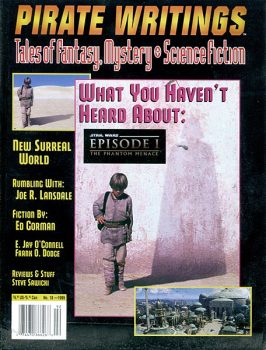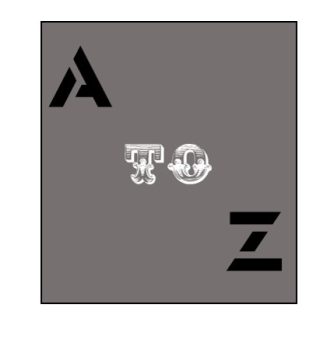A to Z Reviews: “Tag,” by David Kablack
David Kablack’s “Tag” appeared in the 18th issue of the magazine Pirate Writings, which would change its name to Fantastic Stories of the Imagination with the next issue. One of the features of Pirate Writings was the inclusion of a short-short story section. The first story in the section in this particular issue is set in a small town. Charlie, the O’Reilley twins, Wally, and Black Tom O’Faolin, all teenagers on the cusp of adulthood, are spending time playing a game of tag on one of the rare days off the working members of the group have.
Their game is interrupted by one of the village’s outcasts, a hunchback whose father is unknown and whose mother has died, hobbles past them on his way home from the market. Being young boys faced with someone who is an outsider, they stop their game to watch him go by. As Charlie starts the game up again by tagging Tom, Tom gets an idea and tags the hunchback with enough force that he sends his purchases scattering across the ground.

That moment is one of juvenile cruelty, not necessarily evil, but uncaring, and unrepentant nastiness. As the other boys wait to see what will happen, the hunchback lashes out an arm to tag Tom, taking hold of his head. Sensing that vengeance is upon them, most of the boys rush off, but Charlie stays to see the outcome of Tom’s action.
The hunchback forces Tom to his knees and continues to apply pressure, eventually breaking the bones in Tom’s head with his strong arms, but even more, transferring all of the ugliness and his warped features to the teenager before walking off.
The story raises questions about whether the crime justified the punishment. Kablack shows a single moment of cruelty that is paid back with a life destroying amount of force. What isn’t shown is whether Black Tom’s behavior to the hunchback was persistent, although the story implies that the group of teenagers constantly mocked, denigrated, and played pranks on the hunchback. Even if the boys didn’t harass him, it is clear that the villagers as a whole viewed the hunchback as a piteous creature rather than a member of the community, so his response may not just have been to Tom’s actions on the day of the story, but the release of pent-up anger and the hunchback’s treatment by the community.
As with many of the shorter stories, there is an ambiguity to “Tag” which the author may not have meant. Making the story fit into the tight confines of the length for these stories in Pirate Writings may have meant that Kablack didn’t have the time to provide more information about his denouement, but that lack of clarity is one of the things that makes the story memorable.
 Steven H Silver is a twenty-time Hugo Award nominee and was the publisher of the Hugo-nominated fanzine Argentus as well as the editor and publisher of ISFiC Press for eight years. He has also edited books for DAW, NESFA Press, and ZNB. His most recent anthology is Alternate Peace and his novel After Hastings was published in 2020. Steven has chaired the first Midwest Construction, Windycon three times, and the SFWA Nebula Conference six times. He was programming chair for Chicon 2000 and Vice Chair of Chicon 7.
Steven H Silver is a twenty-time Hugo Award nominee and was the publisher of the Hugo-nominated fanzine Argentus as well as the editor and publisher of ISFiC Press for eight years. He has also edited books for DAW, NESFA Press, and ZNB. His most recent anthology is Alternate Peace and his novel After Hastings was published in 2020. Steven has chaired the first Midwest Construction, Windycon three times, and the SFWA Nebula Conference six times. He was programming chair for Chicon 2000 and Vice Chair of Chicon 7.
